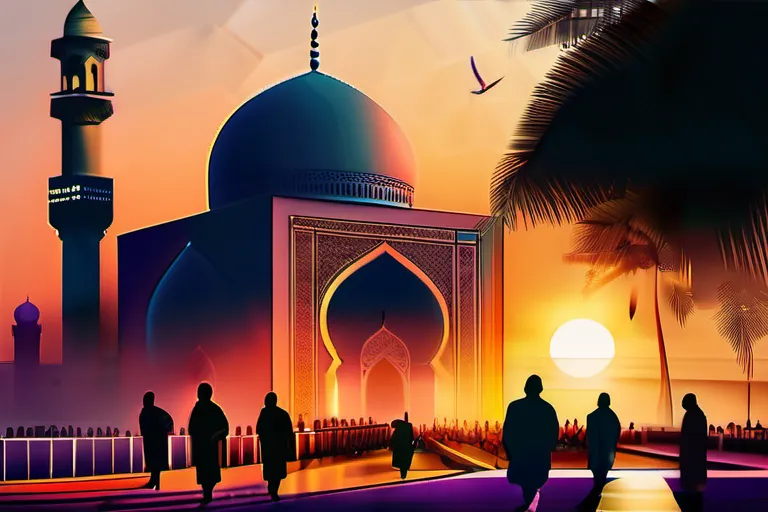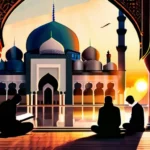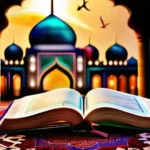Exploring the Influence of Global Islam on Contemporary Faith and Culture
In this comprehensive article, we delve into the profound impact that Islam, the most converted religion in 2021, has on modern religious practices worldwide. From its rich history to its current global presence, we’ll explore how Islam shapes contemporary faith and culture.
The Rise and Spread of Islam
Imagine a river, gently flowing through history, carrying with it centuries of tradition and faith. This river is Islam, one of the world’s largest religions, with a profound impact on modern religious practices worldwide. How did this mighty stream come to shape our global landscape? Let us embark on a journey to explore its historical origins and expansion.
The story of Islam begins in Mecca, a city in present-day Saudi Arabia, where the Prophet Muhammad received his first divine revelations under the guidance of the angel Gabriel. These revelations, recorded as the Quran, became the central text of Islam. The message was simple yet transformative: there is no god but Allah, and Muhammad is His prophet. This declaration resonated deeply with people seeking a new direction in life.
As the Rashidun Caliphate emerged after Muhammad’s death, Islam spread rapidly through military conquests and diplomatic relations. The caliphs not only expanded the geographical reach of the religion but also promoted education and literacy, ensuring that Islamic teachings reached even distant corners of the world.
The Fatimid, Ayyubid, and Mamluk dynasties further solidified Islam’s presence in Africa, Asia, and Europe. Each dynasty brought unique cultural contributions, blending local traditions with Islamic practices. For instance, the Sufi orders emerged as spiritual movements emphasizing personal piety and devotion to Allah.
In contemporary times, Islam continues to influence religious practices across diverse cultures. From the vibrant calligraphy adorning mosques to the daily prayers performed by millions around the globe, the impact of this ancient yet ever-evolving faith is undeniable. As we navigate through the complexities of modernity, Islam serves as a guiding light for many, shaping not only personal beliefs but also societal norms and values.
Islamic Beliefs and Practices
Imagine walking through the bustling streets of a vibrant Islamic city, where the call to prayer echoes from minarets like distant whispers calling to the soul. How does this profound religious practice impact modern religious practices around the world? The five daily prayers, which are central to Islam, serve as a unifying thread that ties believers together, fostering a sense of community and spiritual connection. These prayers, each with its own significance—Fajr at dawn, Zuhr at noon, Asr in the afternoon, Maghrib at sunset, and Isha after nightfall—become a daily reminder of one’s faith and duty towards Allah. But how do these rituals translate into the contemporary world? Do they provide a framework for moral and ethical behavior that resonates beyond religious boundaries?
The rituals of fasting during Ramadan, another cornerstone of Islamic practice, offer a profound spiritual experience. Fasting not only strengthens one’s faith but also serves as a form of self-purification and compassion towards the less fortunate. It is a reminder to empathize with those who struggle daily for basic needs. How do these experiences shape modern interpretations of charity and social responsibility? In today’s fast-paced, materialistic societies, can fasting serve as a counterbalance, encouraging individuals to reflect on their values and contributions to society?
The practice of pilgrimage or Hajj, which is obligatory for every able-bodied Muslim once in a lifetime, transcends personal spiritual growth. It symbolizes unity among believers from diverse backgrounds, highlighting the universal nature of faith. Yet, how does this grand act of devotion influence our understanding of global citizenship and the interconnectedness of humanity? The journey to Makkah is not merely about religious obligation but also about finding a sense of belonging in the broader community of Muslims.
The daily practices of Islam, with their emphasis on modesty, integrity, and compassion, offer a unique lens through which modern religious practices can be viewed. How do these principles guide contemporary ethical discussions? In an era where technology and globalization blur traditional boundaries, the timeless teachings of Islam provide a moral compass that is increasingly relevant in today’s complex world. Are we ready to embrace these teachings as foundational elements of our own spiritual lives?
Islam’s Influence on Culture and Society
How does Islam, the most converted religion in 2021, continue to shape our modern world? In exploring this question, we can’t help but delve into how Islamic values and traditions have left indelible marks on art, literature, politics, and social norms across various regions. Let’s consider a metaphor: if history is a river flowing through time, then the influence of Islam is like an intricate web woven throughout its banks, enriching and sometimes challenging the landscape as it flows.
Artistically speaking, Islamic art often eschews figurative representations in favor of geometric patterns and calligraphy. These designs are not merely decorative; they serve as a form of worship, embodying the beauty and complexity of the divine. This approach to art has profoundly influenced modern design, from fashion to architecture. Have you ever admired the intricate tile work in a mosque or the elegant calligraphy on a piece of Islamic art? You might be seeing the reflection of centuries-old traditions that continue to inspire creativity today.
In literature, the hadith, or sayings and actions of Prophet Muhammad, have been central to shaping narrative styles and themes. Stories from the Quran and Hadith are often used as moral lessons and historical accounts, influencing how narratives are structured in both traditional and contemporary works. Consider the impact on modern storytelling: from films that explore Islamic themes to literature that delves into the lives of religious figures—these stories reflect a deep-rooted cultural legacy.
Politics, too, has been profoundly shaped by Islamic principles such as justice (adl) and the common good (maslahah). The concept of dawah, or call to Islam, often involves not just spreading religion but also promoting social welfare. This has led to various political movements that seek to combine religious and governance values. Think about how these ideas have influenced practices like zakat (charity) in economic policies or the emphasis on education in Islamic states. The question arises: do you see remnants of these principles in your own society’s political structure?
Social norms are another area where Islam’s influence is undeniable. From gender roles and family structures to dietary laws and religious observances, Islamic teachings have provided a framework for many communities. These norms continue to evolve but remain deeply intertwined with the fabric of daily life. For instance, in regions like the Middle East and North Africa, social customs often reflect Islamic values, influencing everything from marriage practices to workplace etiquette.
As we navigate these various facets of Islamic influence, it’s clear that the religion continues to shape our world in profound ways. Whether through art, literature, politics, or social norms, Islam remains a vibrant force in modern society. How do you see this influence manifesting around you? The answers might surprise you and challenge your understanding of what it means to live in a world deeply influenced by one of the world’s major religions.
The Role of Islam in Contemporary Politics
How does Islam, the most converted religion in 2021, shape modern political landscapes? Can we truly understand today’s global conflicts without delving into the intricate layers of Islamic influence on governance and diplomacy?
The impact of Islam on contemporary politics is profound and multifaceted. From the streets of Kabul to the corridors of power in Doha, the principles of sharia law and the concept of ummah (community) echo through political systems. Is it a mere coincidence that countries with significant Muslim populations often grapple with issues of governance, justice, and human rights?
The role of Islam in politics is like a river carving paths through stone; it weaves its way into the fabric of societies, sometimes flowing smoothly, other times causing tumultuous upheavals. Think of how the concept of khilafa, or caliphate, has been both a unifying force and a source of conflict in Muslim-majority countries.
In the realm of diplomacy, Islamic states often find themselves at crossroads, balancing between traditional values and modern global norms. The influence of organizations like the Organisation of Islamic Cooperation (OIC) cannot be understated; it serves as a platform for nations to voice their concerns and seek unity amidst diversity. Yet, how do these diplomatic efforts truly translate into tangible change on the ground?
The impact of Islam on politics is not confined to traditional Muslim-majority countries alone. Even in Western democracies, the political landscape is increasingly shaped by the needs and aspirations of its Muslim citizens. From local community councils to national elections, Islamic values are being integrated into policies and practices.
As we navigate this complex terrain, one question remains: Can modern political systems truly address the diverse needs and expectations of their Muslim populations while maintaining democratic principles? The answer lies in our willingness to engage with the rich tapestry of Islamic thought and practice, recognizing that it is not just a religion but also a vibrant force in shaping the world.
Islam and Globalization
How does Islam, the most converted religion in 2021, impact modern religious practices? To answer this question, let’s dive into the intricate web of globalization and its influence on diverse communities around the world. Imagine Islam as a vast river, flowing through different terrains, adapting to local landscapes yet retaining its essence. This river of faith has been transformed by the currents of globalization, shaping how Muslims practice their religion in myriad ways.
One cannot explore this impact without considering the role of globalization. Globalization acts like a catalyst, accelerating the exchange of ideas, customs, and practices across borders. For instance, take the case of a young Muslim living in a bustling metropolis where cultures intermingle at every street corner. How does their understanding of Islam differ from that of their grandparents? The answer lies in the dynamic interplay between tradition and modernity.
Let’s consider another scenario: online platforms serving as virtual mosques, connecting Muslims worldwide through digital sermons and discussions. This phenomenon challenges traditional notions of religious authority, raising questions about who interprets Islamic teachings in the age of technology. Is it the local imam or the global scholar? The answer is multifaceted, reflecting the complex tapestry of modern religious practices.
Moreover, globalization introduces new challenges and opportunities for Muslims living in diverse environments. For example, how do they reconcile their faith with secular laws in countries where Islam coexists with other religions? This process of adaptation is not without its tensions, but it also fosters a rich dialogue that enriches both religious and cultural landscapes.
So, as we navigate through the modern world, one can’t help but wonder: how will globalization continue to reshape the practice of Islam in the coming years? Will it lead to more uniformity or greater diversity in religious practices? The answers lie in the hearts and minds of Muslims everywhere, navigating their faith with the same resilience they’ve shown throughout history.
The Future of Islam and Its Impact on Religion
How does Islam, the most converted religion in 2021, continue to shape modern religious practices? As we ponder this question, it’s like asking how a river can change its course over time. Just as water carves through rock and shapes landscapes, Islam has subtly but profoundly influenced various faiths around the globe.
Imagine for a moment that every religion is a tree, each with its own roots, branches, and leaves. Now, picture these trees growing taller and intertwining their branches. How does Islam’s growth as a trunk affect the overall canopy of spirituality? In many ways, it’s about adaptation and integration.
Take prayer, for example. The five daily prayers prescribed in Islam have become a reminder of spiritual discipline in many communities worldwide. Could these structured moments of quiet reflection be influencing other religions to incorporate more formal prayer practices into their own rituals?
The emphasis on charity (zakat) and social justice (amanah) in Islamic teachings might also be prompting other religious groups to reassess their community service programs. Is the call for fairness and compassion in Islam resonating within broader religious circles, encouraging them to think more deeply about ethical responsibilities?
Moreover, the spread of Islam across diverse cultures often leads to a blending of traditions. This fusion can lead to innovative practices that reflect local customs while still honoring Islamic principles. Are we seeing this cross-pollination in other religions as well? How are they adapting and evolving through these interactions?
As we look towards the future, it’s clear that Islam’s global presence will continue to influence religious practices. Will there be a greater emphasis on interfaith dialogue and understanding? Could this lead to more inclusive spiritual environments where different beliefs coexist harmoniously?
The potential for change is vast, much like the possibilities when a seed sprouts into a mighty tree. How will Islam’s growth impact the very fabric of modern religious practices? The future is uncertain, but one thing is certain: it promises to be an exciting and transformative journey.
Conclusion
 By understanding the historical roots and contemporary influences of Islam, we can gain valuable insights into the complex interplay between religion, culture, and society in today’s world.
By understanding the historical roots and contemporary influences of Islam, we can gain valuable insights into the complex interplay between religion, culture, and society in today’s world.











